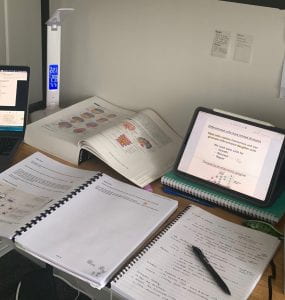
Studying BIOSCI107 in my room!
“Is it possible to work while doing first-year Biomed?”
Kia ora koutou, my name is Nasywa, and one of the most common advice/suggestions I heard about doing first-year Biomedical Sciences is that studying should be your number one priority. Even as I sat down in the busy crowd of the OGGB lecture hall during our first week, I remember one of the professors said that we are expected to spend 40 hours a week studying and treat it like a ‘full-time job’.
However, after talking to several people, a mix of some who have part-time jobs, and those who don’t, I am confident that it is possible to still get your desired grades while working part-time. I’ll be diving into my personal experience and I also interviewed a couple of my friends.
In my case, I had only moved to Auckland a few weeks prior, and trying to juggle the unfamiliar University environment and my new part-time job was the biggest challenge I had to go through this year. Especially during the first few weeks, University can be overwhelming for a first-timer, and adjusting to that new aspect of life was already demanding. Of course, everyone handles situations differently, but if I were to go back and re-do Semester 1 again, I would probably put all my attention towards familiarising myself with how to use Canvas, figuring out my lecture halls, how labs/tutorials work, etc. – and only consider getting a job once I felt like I was all settled in.
My biggest tip, if you want/need to work, is to get a job that provides flexibility regarding the working hours throughout the week, which would be working under a casual contract or a permanent part-time, with less than 10 hours a week.
A couple of my Biomed friends work about 9-10 hours a week on average, and they generally found it to be an ideal balance.
I asked, “How satisfied were you with your grades performance in Semester 1, and do you think working part-time had a big effect on your studying?”
Both said that the amount of work they do (9 and 10 hours) is a good balance between work and study in a week. One of them thinks that not having a part-time job would’ve only made a slight difference, and they both think they did their their best to balance work and study.
To follow up, I also explored hauora (well-being) and whether Biomed has affected that at all.
Friend 1: “Biomed hasn’t really affected my well-being. I feel like I have a good balance between life and studying, and we can also have some life and social time between classes.”
Friend 2: “It affected my well-being in both good and bad ways. The good part is that it gets me closer towards my dream, but the bad part is that it can be mentally draining and stressful.”
So, how do they balance work and study? I asked them how many hours they spend studying outside of lectures:
How many hours do you study in a week (on average)
Friend 1: 20-25 hours a week at home, consisting of 2 to 3 hours from Monday-Saturday and 5 to 6 hours on Sundays.
Friend 2: 21 hours a week, 3 hours each day.
Lastly, I asked how they spend their free time.
How do you spend your weekend and take breaks from studying?
Friend 1: “I work on Saturdays and study on Sundays”
“I only study 2-3 hours each day so I can watch Netflix and spend family time, as it is very important to relax and take a break”
Friend 2: “On weekends I have a social time, like watching Rugby on Saturday with my family, and study the whole day on Sundays.”
“Saturday would be my break day, and when studying on Sunday I take breaks every half an hour. I’d go on my phone, get food, or make coffee”
In conclusion
By taking my time to talk with a couple of my peers and reflect on myself, I do believe that it is possible to still do well in Biomed while also working an appropriate number of hours in a week (averaging about 10) to leave enough time to rest because it is important to remind yourself that studying shouldn’t necessarily be your number one priority.
On the other hand, however, working a part-time job might have a bigger impact if you were aiming for the competitive clinical pathways. If medicine is really where you want to be, it’s definitely safer to not work a part-time job during the first year of Biomed, and spend the 10 hours you have on extra studying. Yet, if you are in a position where you have to, hopefully, this blog shows that it is possible to balance study, work, and social life when taking Biomed, unlike what you might’ve heard people around saying.